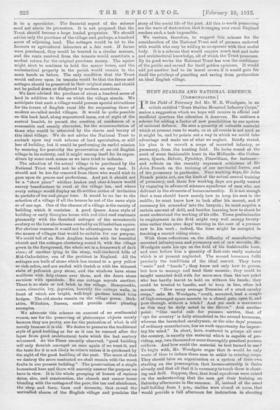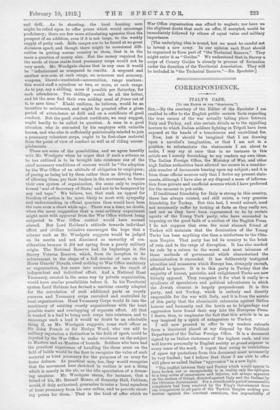I N the Field of February 3rd Mr. W. B. Woodgate,
in an article entitled "Hunt Stables Mounted Infantry Corps," makes a suggestion which we hope will receive in official and unofficial quarters the attention it deserves. He outlines a scheme for adding a factor of new possibilities to our system of national defence. He sees a quantity of valuable material which at present runs to waste, or at all events is not used as it might be, and he points out a way in which we could take advantage and make use of what we neglect. Briefly stated, his plan is to recruit a corps of mounted infantry, or yeomanry, from the hunting field. He looks round at the meet of some fashionable hunt in the Midlands—the Cottes- more, Quorn, Belvair, Pytchley, Fitzwilliatn, for instance— and reflects on the recently expressed. criticisms of Sir John French on the training of our territorial forces, and of the yeomanry in particular. Nine working days, Sir John French points out, are the limit of the actual annual training of yeomanry, and these few working days are partly wasted by engaging in advanced schemes squadrons of men who are deficient in the elements of horsemastership. It is not enough that a man should know merely how to keep his seat in the saddle; he must know how to look after his mount, and if necessary his comrades' into the bargain; he must inspire a certain amount of drill, and besides learning how to shoot he must understand the working of his rifle. These preliminaries to employment in the field might very well occupy twenty- nine rather than nine days' training in the case of a yeoman new to his work ; indeed, the time might be occupied in teaching a. recruit riding alone.
With these reflections on the difficulty of manufacturing mounted infantrymen and yeomanry out of raw recruits, Mr. Woodgate casts his eye on the field of his fashionable hunt, and sees before him a quantity of first-rate ready material which is at present neglected. The second horsemen fulfil precisely the conditions of the ideal recruit. They have " seats " and " hands " ; they know not only how to groom, but how to manage and tend their mounts ; they could be taught mounted drill with far more ease than the raw yokel who has hardly learnt to hold on without his hands; they could be trusted to handle, and to keep in line, other led mounts. "How many average Tommies of a crack cavalry corps," asks Mr. Woodgate, "could, mounted, lead a couple of high-couraged spare mounts to a closed gate, open it, and pass through without a hitch? And yet such a, manceuvre as this may be daily noted in the Shires." And another point: "One useful cult for yeoman service, that of 'eye for country' is daily stimulated in the second horseman, whereas the barracked cavalryman, or the nine days' yeoman of ordinary manufacture, has no such opportunity for improv- ing his mind." In short, here, scattered in grimps all over the country,
is exactly the material which is capable of pro- aiding, say, two thousand or more thoroughly practical yeomen soldiers. And how could the material be best turned to use P To begin with, Mr. Woodgate urges that it would be only waste of time to induce these men to enlist in existing corps. They should hive an orgauization or a system of their own starting on the presumption that horsemastership is theirs already and that all that it is necessary to teach them is shoot- ing and drill. Suppose, then, that local sqnadrons were raised on the understanding that the men got their training on Saturday afternoons in the summer. If, instead of the usual half-holiday from 1 p.m., stables were closed at noon, that would provide a full afternoon for instruction in shooting and drill. As to shooting, the local hunting men might be relied upon to offer prizes which would encourage proficiency; there are few more stimulating agencies than the prospect of an addition, oven if it is not large, to the weekly supply of petty cash. Rifle ranges are to be found at no great distances apart, and though there might be occasional diffi- culties in getting across country to them, that is in the main a question of money also. But the money required for the needs of these stable hunt yeomanry corps would not be very much. Mr. Woodgate claims that in any case it would be "infinitesimal as compared to results. A sergeant and another non-corn. at each range, an armourer and armoury, weapons, liberal—unstinted—ammunition, range markers : this would staff a squadron or two, or more, at each range. As to pay, say a shilling, more if possible per Saturday, for each attendance. Two shillings would be all the better, and let the men find their own midday meal al fresco out of it, to save time." Khaki uniform, he believes, would be an incentive to enlistment, and might be granted after a given period of attendance at drill and on a certificate of good conduct. But the good conduct certificate, we may suggest, ought hardly to be called in question. A man in a good situation who is entrusted by his employer with valuable horses, and who also is sufficiently patriotically minded to join a yeomanry volunteer corps, ought to be first-class material from the point of view of conduct as well as of riding accom- plishments.
These are some of the possibilities, and we agree heartily with Mr. Woodgate when he urges that if such a scheme as he has outlined is to be brought into existence one of the chief necessary conditions of success would be "the adoption by the War Office of an attitude of obligation to employers ; of posing as being led by them rather than as driving them ; of allowing them, per their leaders in the movement, to frame their own system of organization, the same only to require formal seal of Secretary of State,' and not to be hampered by any red tape." We believe, too, that such an appeal for freedom of action is far more likely to meet with sympathy and understanding in official quarters than would have been the case even a short while ago. There was a time, no doubt, when the mere suggestion that a semi-military experiment might meet with approval from the War Office without being subjected to War Office control would have seemed absurd. But Lord Haldane's attitude towards individual effort and civilian initiative encourages the hope that a scheme such as Mr. Woodgate suggests would be judged on its merits and not dismissed as unworthy of con- sideration because it did not spring from a purely military origin. The National Reserve bad its beginnings in the Surrey Veteran Reserve, which, from its inception to its achievement in the shape of a full muster of men on the
Horse Guards' Parade, owed nothing to War Office machinery or organization, but came into existence as the result of independent and individual effort. And a National Hunt Yeomanry, created in the same way by private organization, would have similar possibilitias before it. In his Territorial system Lord Haldane has devised a machine exactly adapted for the correlation of such additional parts as county reserves and Yeomanry corps recruited and controlled by local organizations. Hunt Yeomanry Corps would fit into the machinery of existing county organizations with the least possible waste and overlapping of separate effort. All that is wanted is a lead to bring such corps into existence, and to encourage such a lead it would no doubt be an admirable thing if, as Mr. Woodgate suggests, some such officer as Sir John French or Sir Evelyn Wood, who can add to military reputation a distinction in the field of sport, could be deputed by the War Office to make overtures on the subject to Masters and ex-Masters of hounds. Soldiers who have had the practical experience of handling the three arms on the field of battle would be the first to recognize the value of such material as hunt yeomanry for the purposes of an army for home defence. As practical men, too, they would recognize that the movement here sketched in outline is not a thing which is merely in the air, or the idle speculation of a dream- ' ing amateur. Mr. Woodgate states, for instance, that a friend of his, Mr. Russell Monro, of Somerby Hall, Oakham, would, if duly authorized, guarantee to raise a local squadron ' of hunt yeomanry from his own radius, and to provide shoot- ing prizes for them. That is the kind of offer which no
War Office organization can afford to neglect; nor have we the slightest doubt that such an offer, if accepted, would be immediately followed by others of equal value and military importance.
[The underlying idea is sound, but we must be careful not to invent a new army. In our opinion each Hunt should be organized to form part of "the Technical Reserve." They might enter it as "Guides." We understand that in Surrey a corps of County Guides is already in process of formation under the direction of the Territorial Association. They will be included in "the Technical Reserve."—En. Spectator.]











































 Previous page
Previous page